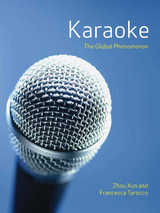
Dancing Queen. Respect. Brandy (You’re a Fine Girl). There are some songs so infectious that you can’t help but belt out the lyrics along with the singer. Karaoke—meaning “empty orchestra” in Japanese—gets rid of the singer and leaves you in the spotlight alone. It is the social manifestation of our desire to sing, in tune or out, and in three short decades, it has exploded into a worldwide craze. In this unprecedented study, Zhou Xun and Francesca Tarocco engagingly examine karaoke and all its associated kitsch, crime, and weirdness.
Usually thought of as the pastime of desperately bad singers and slurring drunks, karaoke has never enjoyed a particularly stellar image. Xun and Tarocco, however, reveal its surprisingly complex history and significant cultural impact around the world. Originating in postwar Japan, karaoke soon spread to Southeast Asia and the West. Karaoke traces how it became a wildly successful social phenomenon that constantly evolved to keep pace with changes in technology and culture. Drawing on extensive research and international travels, the authors chart the varied manifestations of karaoke, from karaoke taxis in Bangkok to nude karaoke in Toronto to the role of karaoke in prostitution. Extensive personal anecdotes reveal the dramatic range of social experiences made possible by karaoke and how the obsession with performance and song has touched politics, history, and pop culture throughout global society.
Karaoke bars are at the heart of rich escapist fantasies and the authors—in readable fashion and using vibrant full-color illustrations—document this unpredictable fantasy world and the people who inhabit it. Karaoke,therefore, will delight anyone who has had the courage to take the mike and front the “empty orchestra.”

No one is better equipped to tell this story than novelist and historian Elizabeth Wilson. With a penchant for tennis’s inherent drama, she finds its core: a psychological face off between flamboyant personalities navigating the ebbs and flows of fortune in the confines of a 78 x 36–foot box—whether of clay, grass, or DecoTurf. Walking the finely kempt lawns of Victorian England, she shows how tennis’s early role as a social pastime that included both men and women—and thus, lots of sexual tension—set it apart from most other sports and their dominant masculine appeal. Even today, when power and endurance are more important than ever, tennis still demands that the body behave gracefully and with finesse. In this way, Wilson shows, tennis has retained the vibrant spectacle of human drama and beauty that have always made it special, not just to sports fans but to popular culture.
Telling the stories of all the greats, from the Renshaw brothers to Novak Djokovic, and of all the advances, from wooden racquets to network television schedules, Wilson offers a tennis book like no other, keeping the court square in our sights as history is illuminated around it.
READERS
Browse our collection.
PUBLISHERS
See BiblioVault's publisher services.
STUDENT SERVICES
Files for college accessibility offices.
UChicago Accessibility Resources
home | accessibility | search | about | contact us
BiblioVault ® 2001 - 2024
The University of Chicago Press









